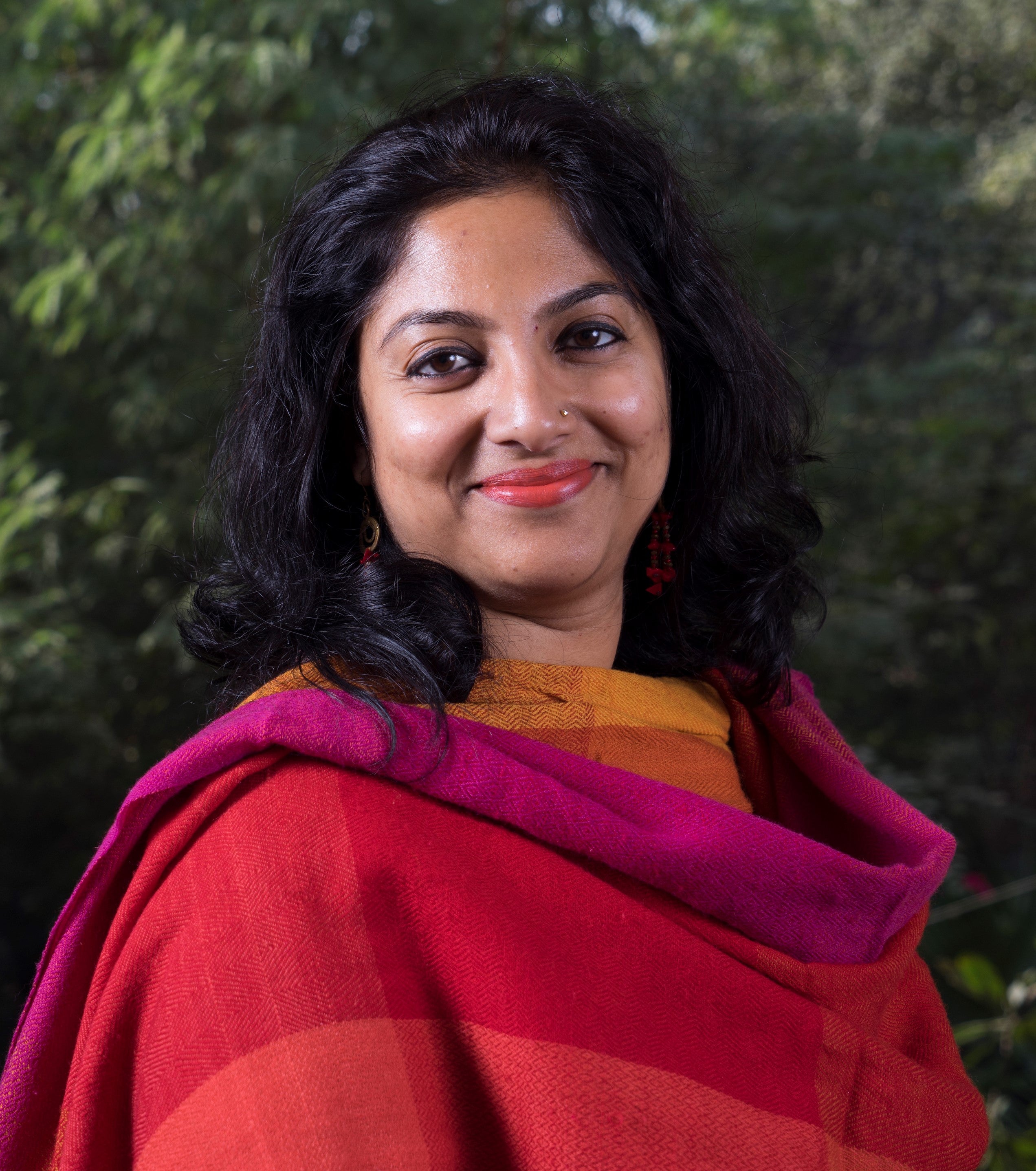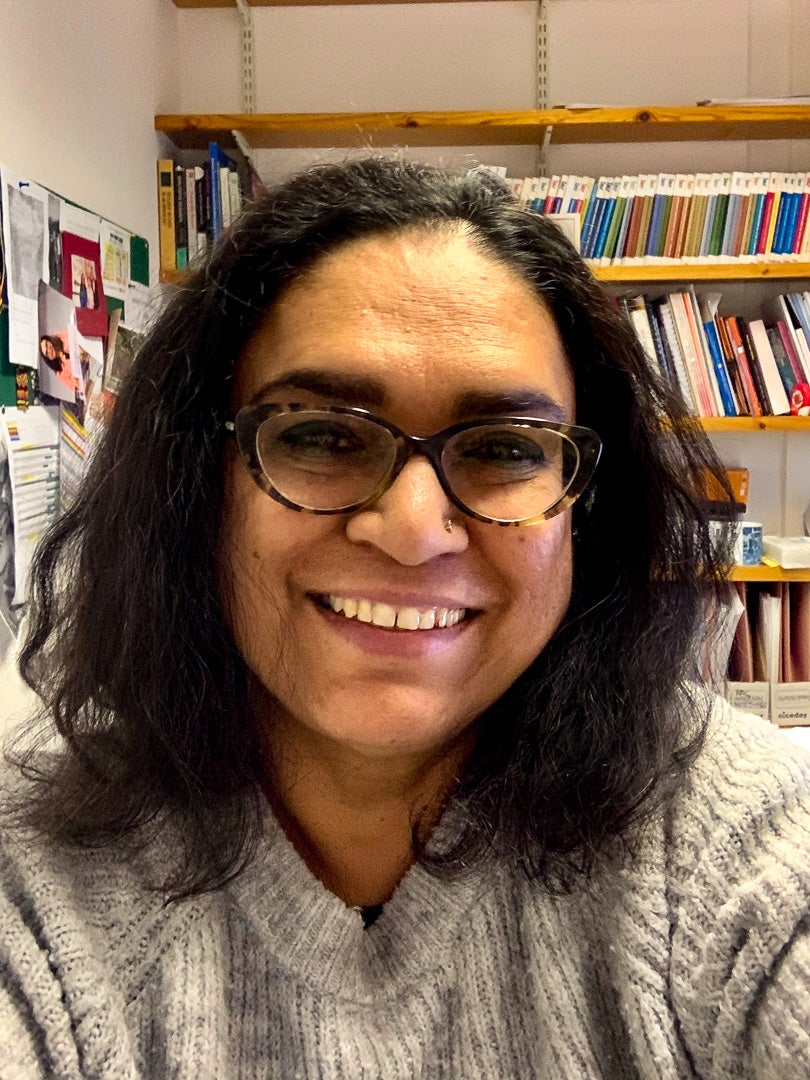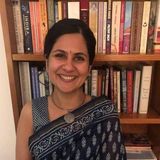 Mukta Naik is an architect and urban planner and a Fellow at the Centre for Policy Research (CPR), New Delhi. Her research interests include housing and urban poverty, urban informality, and internal migration, as well as urban transformations in small cities. Prior to joining CPR, she worked on community-based interventions to improve housing in informal settlements. Ms. Naik has written widely in print and digital media and has also run a market research and media services company. As trustee for a Gurugram-based NGO and a Board Member for a Netherlands-based Foundation, she is also deeply involved with community-based initiatives. Ms. Naik is a graduate of the School of Planning and Architecture and has a Master’s degree in urban and regional planning from Texas A&M University. She is currently pursuing a Ph.D. in Urban Development and Governance from the Institute for Housing and Urban Development Studies (IHS), Erasmus University Rotterdam.
Mukta Naik is an architect and urban planner and a Fellow at the Centre for Policy Research (CPR), New Delhi. Her research interests include housing and urban poverty, urban informality, and internal migration, as well as urban transformations in small cities. Prior to joining CPR, she worked on community-based interventions to improve housing in informal settlements. Ms. Naik has written widely in print and digital media and has also run a market research and media services company. As trustee for a Gurugram-based NGO and a Board Member for a Netherlands-based Foundation, she is also deeply involved with community-based initiatives. Ms. Naik is a graduate of the School of Planning and Architecture and has a Master’s degree in urban and regional planning from Texas A&M University. She is currently pursuing a Ph.D. in Urban Development and Governance from the Institute for Housing and Urban Development Studies (IHS), Erasmus University Rotterdam.
The lack of affordable and adequate housing has been a barrier in the incorporation of internal migrants at destination locations in India. Small-scale landlords and employers have filled this gap through informal rental and on-site housing arrangements, however these have often been exploitative. Since the 2020 migrant crisis in the wake of the COVID-19 lockdown, the Government of India has introduced an affordable rental scheme and a model tenancy legislation, in the hope of catalysing the rental ecosystem. At this juncture, it is worth asking how policy could address the messy realities of migration and how city plans could respond to housing needs of mobile workers. This presentation will be based on a study of the government's recent rental scheme, published work on informal renting, and an ongoing engagement with a citizen's collective engaging with Delhi forthcoming master plan. [Read More]
 Priya Deshingkar is an internationally recognized authority on South-South migration research and policy analysis. She has played a key role in influencing the global policy discourse on internal migration and development. She has provided expert advice to the Indian Ministry of Urban Affairs and Niti Aayog (India's Planning Commission) on migration-related issues in the wake of COVID-19 and is currently participating in the policy dialogue on the new draft Migrant Labour Policy.
Priya Deshingkar is an internationally recognized authority on South-South migration research and policy analysis. She has played a key role in influencing the global policy discourse on internal migration and development. She has provided expert advice to the Indian Ministry of Urban Affairs and Niti Aayog (India's Planning Commission) on migration-related issues in the wake of COVID-19 and is currently participating in the policy dialogue on the new draft Migrant Labour Policy.
She will be exploring issues related to seasonal, circular, and other forms of mobility and the bureaucratic barriers that they face in living and earning with dignity and fair remuneration.
 Gareth Nellis is an Assistant Professor of Political Science at the University of California, San Diego. He specializes in comparative politics and South Asia. His research addresses the extent to which elections serve as instruments of social inclusion or exclusion in developing democracies. One line of work examines the electoral rise of violent ethno-religious nationalism; the other aims to understand the political marginalization of internal migrants. He received his Ph.D. from Yale University and was previously the Evidence in Governance and Politics Postdoctoral Fellow at the University of California, Berkeley.
Gareth Nellis is an Assistant Professor of Political Science at the University of California, San Diego. He specializes in comparative politics and South Asia. His research addresses the extent to which elections serve as instruments of social inclusion or exclusion in developing democracies. One line of work examines the electoral rise of violent ethno-religious nationalism; the other aims to understand the political marginalization of internal migrants. He received his Ph.D. from Yale University and was previously the Evidence in Governance and Politics Postdoctoral Fellow at the University of California, Berkeley.
 Nikhar Gaikwad is an Assistant Professor in the Department of Political Science and a Member of the Committee on Global Thought at Columbia University. He specializes in international and comparative political economy, with a focus on the politics of economic policymaking, business-state relations, and identity. Substantively, he works on trade, migration, and environmental policymaking. He has a regional specialization in India, which he studies in comparative perspective with other democratic emerging economies. Prior to joining Columbia University, he was a Fellow at the Niehaus Center for Globalization and Governance at Princeton University. He received his Ph.D., with departmental and university distinction, in Political Science from Yale University, and BA, magna cum laude, in Economics and Political Science (honors) from Williams College.
Nikhar Gaikwad is an Assistant Professor in the Department of Political Science and a Member of the Committee on Global Thought at Columbia University. He specializes in international and comparative political economy, with a focus on the politics of economic policymaking, business-state relations, and identity. Substantively, he works on trade, migration, and environmental policymaking. He has a regional specialization in India, which he studies in comparative perspective with other democratic emerging economies. Prior to joining Columbia University, he was a Fellow at the Niehaus Center for Globalization and Governance at Princeton University. He received his Ph.D., with departmental and university distinction, in Political Science from Yale University, and BA, magna cum laude, in Economics and Political Science (honors) from Williams College.
Migrants are politically marginalized in cities of the developing world, participating in destination-area elections less than local-born residents do. Drs. Nellis and Gaikwad theorize three reasons for this shortfall: migrants’ socioeconomic links to origin regions, bureaucratic obstacles to enrollment that disproportionately burden newcomers, and ostracism by antimigrant politicians. They will present the results of two randomized control trials from India testing these claims. An overarching conclusion is that onerous registration requirements impede the political incorporation, and thus the wellbeing, of migrant communities in fast-urbanizing settings. [Read More]
 Maansi Parpiani works at the intersections of labor studies, development studies, and urban studies. She leads the research initiatives on labor migration and informality at Aajeevika Bureau. She completed her Ph.D. from the University of Copenhagen in 2019 on urban informality of work in Mumbai. She is also an associated researcher at the Global Health department at University of Copenhagen.
Maansi Parpiani works at the intersections of labor studies, development studies, and urban studies. She leads the research initiatives on labor migration and informality at Aajeevika Bureau. She completed her Ph.D. from the University of Copenhagen in 2019 on urban informality of work in Mumbai. She is also an associated researcher at the Global Health department at University of Copenhagen.
In this presentation, Dr. Parpiani discusses the everyday risks of fires, amputations, and death faced by migrants in small-scale manufacturing work. The presentation is based on ethnographic research conducted by Aajeevika Bureau in Mumbai – in an industrial neighborhood of small enterprises producing metal spare-parts, garments, and plastic goods. Here, migrants from Uttar Pradesh work under production pressures on old, second-hand machines and little state oversight. As many also sleep at the worksite, the "occupational" dangers remain pervasively present. Informally employed through verbal contracts, workers cannot claim preventive measures from the state or employer. They rely instead on their collective skill and experience to keep the worksite and each other safe through informal apprenticeship systems by which they train the next line of workers. Though most accidents and fires go unreported, when reported, the state and media quickly term the work "illegal," making migrants responsible for their own injuries. [Read More]

